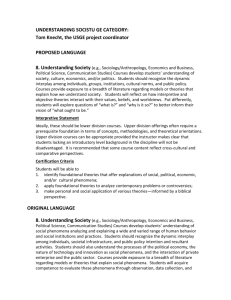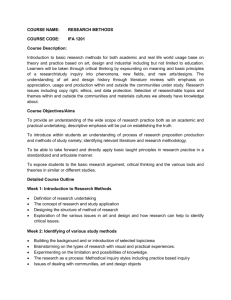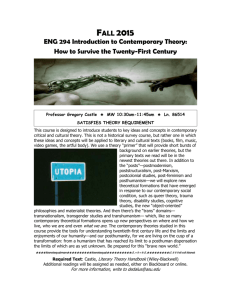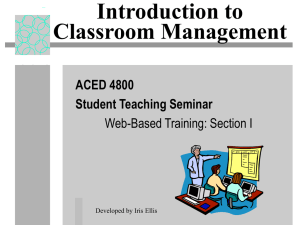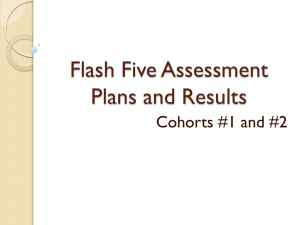Discipline Outcomes
advertisement
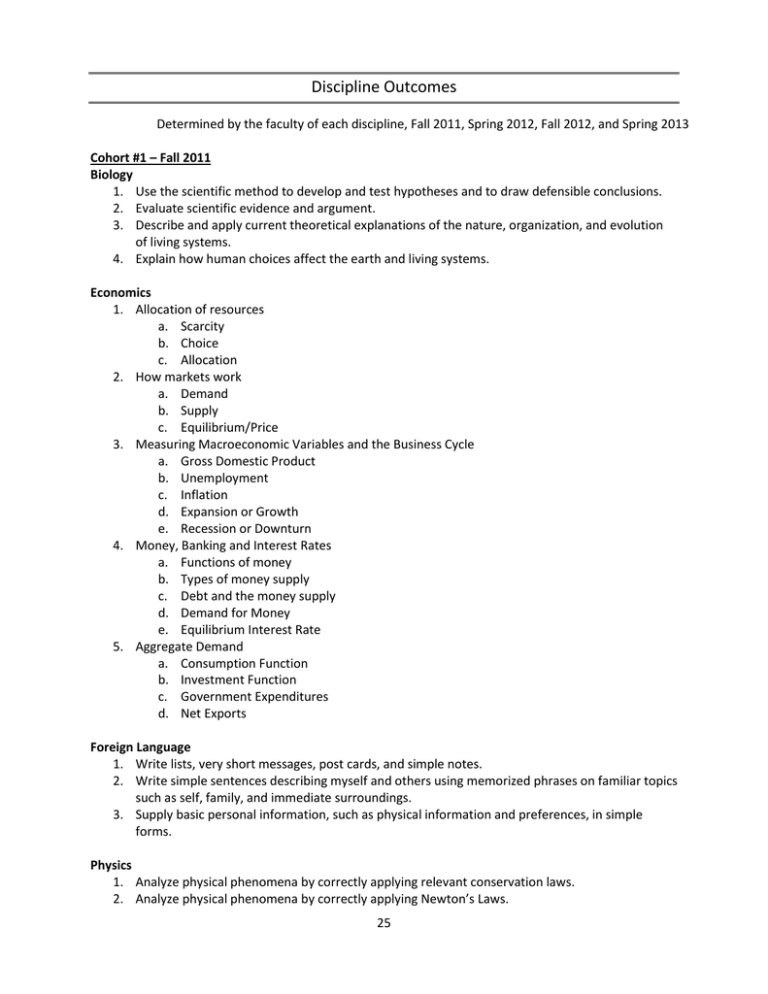
Discipline Outcomes Determined by the faculty of each discipline, Fall 2011, Spring 2012, Fall 2012, and Spring 2013 Cohort #1 – Fall 2011 Biology 1. Use the scientific method to develop and test hypotheses and to draw defensible conclusions. 2. Evaluate scientific evidence and argument. 3. Describe and apply current theoretical explanations of the nature, organization, and evolution of living systems. 4. Explain how human choices affect the earth and living systems. Economics 1. Allocation of resources a. Scarcity b. Choice c. Allocation 2. How markets work a. Demand b. Supply c. Equilibrium/Price 3. Measuring Macroeconomic Variables and the Business Cycle a. Gross Domestic Product b. Unemployment c. Inflation d. Expansion or Growth e. Recession or Downturn 4. Money, Banking and Interest Rates a. Functions of money b. Types of money supply c. Debt and the money supply d. Demand for Money e. Equilibrium Interest Rate 5. Aggregate Demand a. Consumption Function b. Investment Function c. Government Expenditures d. Net Exports Foreign Language 1. Write lists, very short messages, post cards, and simple notes. 2. Write simple sentences describing myself and others using memorized phrases on familiar topics such as self, family, and immediate surroundings. 3. Supply basic personal information, such as physical information and preferences, in simple forms. Physics 1. Analyze physical phenomena by correctly applying relevant conservation laws. 2. Analyze physical phenomena by correctly applying Newton’s Laws. 25 3. Given an experimental scenario, critique the method and results based on accepted scientific method and principals. 4. Relate course topics to personal experience and societal and environmental issues. Engineering 1. Design a system, component, or process to meet desired needs within realistic constraints such as economic, environmental, social, political, ethical, health and safety, manufacturability, and sustainability. 2. Apply knowledge of mathematics, science, and engineering to solve engineering problems. 3. Use the techniques, skills, and modern engineering tools necessary for engineering practice to model physical phenomena. 4. Express knowledge of contemporary issues. Cohort #2 – Spring 2012 Chemistry 1. Use Atomic and Molecular theory 2. Carry out math calculations/relationships 3. Write formulae, balanced equations, Chemical Names and terms 4. Assess validity of data, measurements Geology/Geography Earth Sciences: 5. Students will be able to describe and explain the evidence leading to the theory of plate tectonics and its relationship to earthquakes, volcanoes, mountain building, and surficial processes. 6. Describe the interactions between the lithosphere, atmosphere, hydrosphere, and biosphere. 7. Describe the processes by which rocks are formed and explain how they are classified. Human Geography: 1. Explain the processes that are leading to political, cultural, and economic changes in world regions. 2. Use informed geographic principles to analyze current world issues. 3. Use maps and other graphical data to understand spatial relationships between cultural diversity and geographic regions. History 1. Analyze and contrast the experiences of distinct groups of people during specific historical periods. 2. Identify and explain the spectrum of political theories and principles in a particular historical period or civilization. 3. Employ primary source documents to demonstrate the historical method of inquiry. Philosophy 1. Demonstrate logical/critical thinking ability by identifying the premises and conclusion of an argument. 2. Evaluating the acceptability of the premises of a given argument. 3. Evaluating the relevance of the premises of a given argument to its conclusion. 4. Evaluating and constructing arguments with adequate grounds, making the conclusion more plausible than not. 26 5. Apply defensible reasoning to the evaluation of traditional and contemporary philosophical arguments, as well as those found in non-philosophical writing. Psychology 1. Students will learn the nature of psychology as a discipline. 2. Students will use the concepts, language, and major theories of the discipline to account for psychological phenomena 3. Students will explain major perspectives of psychology 4. Students will evaluate the quality of information; identify and evaluate the source, context, and credibility of behavioral claims; challenge claims that arise from myths, stereotype, or untested assumptions; evaluate popular media reports of psychological research and make linkages or connections between diverse facts, theories and observations. Sociology 1. Students will learn Theoretical Perspectives 2. Students will learn and develop the Sociological Imagination 3. Students will learn Research Methods 4. Students will learn Cultural Relativism Anthropology 1. Construct narratives of cultures based on anthropological data and theories. 2. Discuss the methods by which humans adapt to various environments. 3. Explain the importance of cultural relativity in the study and evaluation of cultures. 4. Use the scientific method of inquiry to solve problems related to anthropology. 5. Evaluate the methods and perspectives of anthropology that contribute to applied science. Cohort #3 – Fall 2012 Art 1. Demonstrate an understanding of methods and materials relevant to art production, including traditional and contemporary media. 2. Apply an understanding of visual literacy in the production, appreciation, and analysis of visual imagery. 3. Articulate verbally knowledge gained about art and it relationship to the culture in which it was produced. English 1. Use writing process 2. Develop writings of various lengths appropriate for audience and purpose. 3. Research and use sources in writing 4. Use documentation principles in a piece of writing. Library 1. Identify a research goal. 2. Demonstrate use of practical techniques for academic research. 3. Evaluate results of applied research techniques. Music 1. Demonstrate an understanding of significant stylistic aspects of each historical era 2. Describe musical development within the context of other aesthetic arenas 3. Identify by title and composer several musical examples from each ere 27 4. Recognize the social, political, philosophical trends that have influenced the music of each historical era 5. Synthesize the progression of music through the ear and its relevance to the music of the current era Political Science 1. Explain the distribution of powers and the protection of rights in the U.S. and Missouri Constitutions 2. Analyze the Role of Media as a provider and filter of information for political discourse and socialization 3. Explain the differences between political parties and interest groups; Analyze their roles in influencing elections and public policy 4. List and describe forms of political participation. Analyze types of participation for efficiency and effectiveness in particular situations. Speech/Drama 1. Manage communication apprehension levels in performance situation. 2. Identify and distinguish between key ideas and supporting ideas. 3. Utilize presentation skills in the communication process. Cohort #4 – Spring 2013 Business/Accounting 1. Produce financial statements using the complete accounting cycle. 2. Analyze corporate balance sheets, income statements, and cash flow statements. 3. Produce financial statements with proper disclosures, asset management, income determination, and valuation of liabilities and investment. 4. Utilization of accounting software packages in a computerized business accounting system. 5. Application of Internal Revenue Code as applied to individual forms. Computer Science 1. Use industry specific software and/or apply troubleshooting skills to solve problems. 2. Create and defend solutions to real life business challenges. 3. Demonstrate professional oral and written communication skills. 4. Work effectively in a team environment. 5. Recognize the need for continued professional development. Counseling 1. Identify goals for self-improvement 2. Investigate resources for personal success, career and life skills 3. Evaluate factors in decision making Education 1. Explain state standards designed to evaluate teachers 2. Specify characteristics of effective teachers and/or teaching 3. Defend theories of diverse approaches to learning 4. Summarize teaching strategies and resources to meet diverse student learning needs 28 Math 1. Interpret and analyze graphical representations to solve problems. 2. Analyze problems and identify which algebraic methods and formulas are needed and solve the problem. 3. Interpret and recognize reasonable answers. Reading 1. Students will identify stated main idea & supporting major details in a narrative passage. 2. Students will identify stated main idea & supporting major details in an informational passage. 3. Students will identify implied main idea & supporting major details in a narrative passage. 4. Students will identify implied main idea & supporting major details in an informational passage. 29
